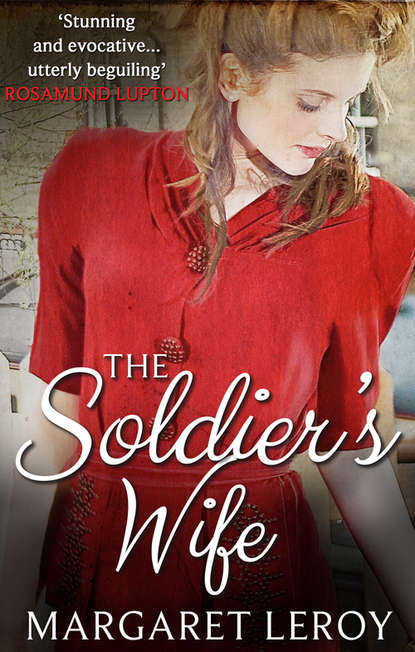По всем вопросам обращайтесь на: info@litportal.ru
(©) 2003-2024.
✖
The Soldier’s Wife
Настройки чтения
Размер шрифта
Высота строк
Поля
This bedroom is at the front of the house; from the window, you can see out over my yard, and the roof and front garden of Les Vinaires next door. I dust the sill, looking out. Connie loved plants, and her garden is full of the loveliest things—honeysuckle, and fuchsias, and Oriental poppies, their colours singing together, scarlet and amber and pink, so vivid, and fading so quickly, just one day in flower and then a bright blown litter of petals over the lawn. But the garden is looking neglected already, grass straggling into the borders, the roses gangly and reaching out over the path, all the neat boundaries blurring and lost—everything grows so fast in high summer. I remember Connie saying, ‘Keep an eye on things for me, won’t you, Viv?’ I feel guilty that I’d forgotten. I ought to try and do something—weed the borders, cut the grass. I tie a knot in my handkerchief to remind me.
A sound comes through my open window—the chunter of an engine drawing nearer down the lane. My pulse quickens. Someone must be disobeying the rules and using a car; whoever it is may be endangering us. I wait to see who will drive past.
But as I watch, a German vehicle draws up at Les Vinaires. Two men in uniform get out. They stand talking for a moment in the profound wet shade of the lane. A little wind ruffles the leaves and the shadows of leaves dance over them. I feel a sense of shock, my heart drumming, to see these invaders standing there, surrounded by the secret gardens and orchards of these deep valleys. Just as Blanche said, these men are tall, much taller than island men. The sunlight glints on their buckles and jackboots and the guns at their belts. They look entirely out-of-place in the leaf-dappled light, amid the cowpats and the potholes, between the hedgebanks with their jumble of leaves and entangled flowers and briars.
They open the gate of Les Vinaires, walk up the path to the door. They seem too big for the garden. I notice that one of them has a clipboard in his hand. There’s a bang and a crack as the other man breaks the lock of the door.
Rage surges through me, and a hot flaring shame: that I can’t stop them, can’t protect Connie’s house from them. That I’m so utterly helpless.
In a little while they come out again, and go back down the path. My rage is blotted out by fear: it’s as though a small cold hand is fingering the back of my neck. Angie’s words are there in my mind. They crucify girls. They rape them and crucify them … What if these soldiers come in here and take our house, as well? They own us, they can do as they wish, they could walk in anywhere—there’s nothing to stop them, nothing.
But for now, they drive off.
Later I hear another engine. I rush upstairs to my bedroom, look out over the lane.
It’s a different vehicle this time, with four men in it—two in the cab, and two in the back. I watch as the men in the cab get out. One is spare and dark, with a hollow, cynical face, the other is rather broad-shouldered, with greying hair. The second man takes out a pack of cigarettes, taps it to release one, holds it between his lips as he fumbles for his lighter. I notice that he has a ragged pink scar on his cheek. I’m immediately curious. I wonder how he acquired the scar, what happened to him. Perhaps he fought in the Great War: his face has a lived-in look, and there’s a web of lines round his eyes—he seems old enough. I wonder what he has been through, what he has seen. How much this injury hurt him.
Then I push the thought away. These men are the enemy: I shouldn’t really be thinking about them at all.
The other two men are younger and both have fair hair. I guess they are lower in rank than the men who sat in the cab. They jump down, pull out kitbags. The man with the scar goes round to the back of the vehicle, and holds the cigarette in his mouth as he reaches in for his bag. The man with the hollow face pushes open the gate. All four of them seem more leisurely than the men who came with the clipboard. They look around with an appraising air—almost an air of ownership: and, seeing this, I feel a flare of impotent rage. They’re joking, laughing, their gestures expansive, easy. They have the look of men who have come to the end of a journey.
They walk down the petal-littered path between the overgrown borders. The roses snag on their uniforms as they push their way through the flowers; the hollyhocks, pale as skimmed milk, brush against their legs as they pass. I see that Alphonse is sleeping in a pool of sun on the path; it’s a favourite sleeping spot of his, because the stone gets warmed there. He’s curled in a perfect circle, as though he feels quite safe. As the men approach he wakes, and languidly stretches. One of the younger men crouches to stroke him, makes a fuss of him; the man has the kind of pink, freckled skin that peels in the sun. Alphonse rubs against the man and arches his back ecstatically, so I can see the supple bones rippling under his fur. I feel an irrational surge of fury with the animal—that he’s so easily won over, that he isn’t resisting at all.
The men go in and don’t come out again.
An hour or two later, I’m in my yard in front of my house, picking some herbs for a stew, when I see that the window of Les Vinaires that overlooks us is flung open. I can hear German voices through the window. I can’t tell what they’re saying—I know only a little German, just the words of some Bach cantatas, from when I was in London and used to sing in a choir. I can’t even judge the emotion from the sound of the words.
The thought slams into me—that we will be so exposed. When we are out in our yard, or if our front door is open, the Germans will hear our conversations. I wonder if they will understand us, if they speak English at all. But even if they can’t understand us, they will see what we do: whenever I come here to pick some herbs they will see. We won’t be able to hide from them.
The day feels unstable, feverish. The outward things—the sigh of the wind in my pear tree, the long light of afternoon slanting into my yard—all these things are just so, just as they should be: yet it feels as though there’s something strange on the air, subtle but troubling as a faint smell of scorching, or an insect whine that’s almost too high to be heard.
I will have to move these pots that stand beside my door. I will carry them through to the back of the house and put them out on the terrace. There I’ll be able to tend them without being seen.
But I stand for a moment, irresolute. Something in me is reluctant. I hear Evelyn’s assertion in my mind: I’m not going to hide away, Vivienne. I’m hurt that you thought that I would. I’m not going to let the Hun move me about. And in that moment I make my decision. I will leave my herbs and geraniums here—leave everything just as it was. This is the only protest I can make, the only way I can fight this: to live as I have always lived, not let them change me at all.
Millie stares at the cat’s bowl of food, which hasn’t been touched.
‘Where’s Alphonse?’
‘I don’t know, sweetheart.’
‘But it’s nearly night-time.’
‘Don’t worry, sweetheart, I’m sure he’ll turn up. Cats always find their way home.’
But Millie is unhappy, a frown pencilled in on her forehead. I think, guiltily, that she’s worried because the cat was so nearly put down: she has a new sense of Alphonse’s vulnerability.
I read her a story, but she can’t sit still. She keeps jumping up and going to the kitchen, looking for him.
‘It’s the Germans, isn’t it?’ she says. ‘The Germans have taken Alphonse.’
‘I don’t expect so,’ I say.
‘I want him back, Mummy,’ she says. ‘And I want my ball back. Everything’s horrible.’ Her face crumples up like paper, and tears spill from her eyes.
I’d forgotten about the ball that she lost in the garden of Les Vinaires.
‘Millie, the ball’s not a problem. I can easily buy you another one …’
She ignores this. She rubs her tears away angrily.
‘Blanche says it’s the Germans. Blanche says the Germans eat people’s cats,’ she tells me. Her voice is shrill with outrage.
‘She was teasing you, Millie,’ I tell her. ‘I really don’t think they do.’
But I wonder if Alphonse’s absence is in fact the Germans’ fault—remembering the young blond man and how he petted the cat. Perhaps he has put out food for him. Cats have no loyalty.
I listen to Millie’s prayers, and tuck her up in bed.
‘You’ve got to find him,’ she tells me, sternly.
The sky through the living-room window darkens, to a rich cobalt blue, then to night. There’s a silver scatter of stars, a slice-of-melon moon. Still the cat doesn’t come home. It’s well after nine o’clock now. I think about the curfew, but the blackout curtains are already drawn at Les Vinaires, and everywhere is quiet.
I decide I will go out and look for the cat. I know I can be silent, and I’m sure I won’t be seen.
My back door isn’t overlooked from the windows of Les Vinaires. I go out that way, into the yawn of a black night. I cling to the hedgebank, creep along in the shadows, edge up the lane as far as the track that leads to Les Ruettes. I don’t dare call, but I’m hoping Alphonse will hear me—or maybe sense my presence, with that strange sixth sense that cats have.
There’s a sudden engine noise behind me. It must be German soldiers, now that islanders can’t use cars. I’m suddenly very afraid, my pulse racing, a cold sweat of fear on my skin. I slip through a gap in the hedge, crouch down in the field. The headlights sweep over the hedgebank and pass. I pray they didn’t see me. Then I hear the car slow and come to a stop. It must belong to the Germans who have moved into Les Vinaires.
I creep back to my house, and close the door on the night. Relief surges through me that at least I got home safely. Alphonse is on a chair in the kitchen, licking himself assiduously. I curse him under my breath.
I take him up to Millie. Her face shines.
But I can’t believe I did this. I think of something that the aunts who raised me were always saying to me, ‘Vivienne, you’re too trusting. You shouldn’t let people walk all over you. You shouldn’t be such a doormat … Your soft-heartedness will get you into trouble, one of these days …’ I think that perhaps they were right. I’ve been so stupid, so irresponsible, taking this risk for a cat, just because Millie was a bit unhappy.
* * *
I’m making my coffee at breakfast-time when I spill a jug of milk. Anxiety must be making me clumsy. I’m on my knees on the kitchen floor, wiping up the spillage, when there’s a crunch of boots on our gravel and a rapid knock at our door.
It’s one of the men from Les Vinaires, the spare dark man with the hollow face. His uniform, his nearness, make me immediately afraid. And mixed in with the fear, I have a sense of embarrassment, that I’m in my apron, a dishcloth in my hand, that he can see into my kitchen, which is messy with wet washing hung on the rail in front of the stove. I have some inchoate sense that I am letting the side down.
‘Good morning,’ he says. His English is very precise and measured. I can see him noticing my apron, and the pool of milk on the floor. ‘I’m afraid I may have come at an inconvenient time.’
I’m about to say, ‘That’s all right’, the automatic response to his concession. But it isn’t all right—nothing is all right. I bite my tongue to stop myself from speaking.
He puts out his hand. This shocks me. I think how they bombed the harbour when all our soldiers had gone; how they shot at the lorries so the petrol tanks would explode, when the men were sheltering under them; of Frank’s burnt and bleeding body. I shake my head; I push my hands in my pockets. I can’t believe he thought I’d be willing to shake his hand.
He lowers his hand, shrugs slightly.









